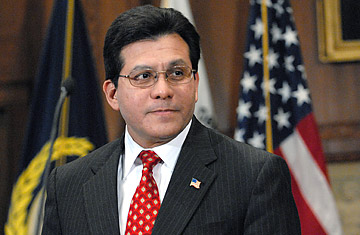
Attorney General Alberto Gonzales speaks to reporters about the ongoing controversy regarding U.S. attorneys who were forced to resign, during a news conference at the Justice Department in Washington, D.C., March 13, 2007.
(2 of 3)
Those e-mails show that Miers first proposed firing all 93 U.S. attorneys shortly after Bush was reelected in 2004. After her idea was rejected by DOJ and White House political guru Karl Rove, Sampson, Gonzales's chief of staff, suggested forcing out a more limited number of U.S. attorneys. In consultation with Miers and others at the White House and DOJ, Sampson drew up a hit list and detailed plans to oust them, with a heavy emphasis on politics.
In one e-mail, Sampson notes that the appointment of Tim Griffin to a U.S. attorney slot in Little Rock, "was important to Harriet [Miers], Karl [Rove], etc." In response, Democrats said they would investigate the "etc." — to discover which persons at the White House or DOJ he might have been referring to.
The e-mails also made clear that the criteria for dismissing U.S. attorneys was not simply "performance-related issues" — as the Administration has asserted — but their aggressiveness in bringing prosecutions on G.O.P. signature political issues like immigration and drugs , as well as the sensitive matter of alleged voter fraud.
Ever since the 2000 Presidential election, G.O.P. officials around the country have argued that Democrats are benefiting from votes cast by those with inadequate identification, felons or persons forging signatures on absentee ballots. Democrats have called this charge a Republican attempt to win elections by suppressing tallies of eligible voters.
In one case, according to John McKay, a fired U.S. attorney from Washington State, both White House counsel Miers and a Republican member of Congress raised the issue of voter fraud in the state's close 2004 election. McKay told lawmakers that when he met Miers and other Administration officials to review his fitness for a position as a judge, she asked him why he had "mishandled" the 2004 election, apparently by not bringing voter fraud cases that might have tipped the balance toward the Republican candidate, who ultimately lost. McKay did not receive a judicial nomination.
